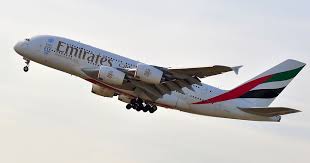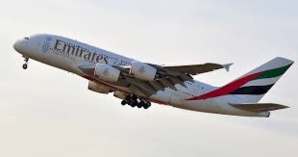The leader of Emirates in Dubai has asked Rolls-Royce to concentrate on improving the performance of its engines and go "back to basics," just one day after the British company revealed intentions to increase profits by four times.
The engine manufacturer's stock increased after CEO Tufan Erginbilgic revealed on Tuesday a plan to turn around the company's financial situation that included "value-driven pricing," which included higher service costs, and a significant boost in profit margins.
However, Tim Clark, the president of Emirates Airline, who chastised Rolls at last month's Dubai Airshow over pricing and the performance of its largest engine, seemed unmoved by the plans, which hinge on a substantial increase in civil engine profit margins to 15–17%.
"If you have an engine ... not performing as it should do, your costs are going to rise. But your ability to extract value from the client is going to fall simply because the client won't accept non-performance," he told Reuters, referring to the costs borne by engine makers due to service contracts per flight hour.
"It's a very clear kindergarten understanding of cause and effect. Get your product right, design it to what the client wants, give it that high level of reliability. And yes, paradoxically, you can extract more value for your money for your buck in terms of your investment."
Clark dismissed the possibility of signing a contract to purchase the larger of two Airbus A350-1000 models at this month's air show, citing a disagreement with Rolls over the engines' lower-than-expected longevity and pressure for increased servicing costs.
"I said, guys, you need to go back to basics. Design engines that meet what the client base wants," Clark recalled saying to the engine maker during negotiations, which ultimately gave way to a top-up order for the smaller A350-900.
"We were ready on the -1000. You have no idea how much work I've spent on the interiors of these airplanes," Clark said, adding the engine stand-off had "opened the door" to reviving the Boeing 777-8 as a passenger variant as well as a freighter.
Following its investor presentation on Tuesday, Rolls-Royce had nothing further to say. There were no comments from Airbus.
Although Rolls has admitted that the XWB-97 engine is experiencing more downtime than anticipated, it has refuted Clark's claims that the engine's performance level is "defective".
Although Clark noted that Rolls planned to bring some improvements inherited from its Ultrafan engine technology research in late 2025 or 2026, he indicated that ordering the A350-1000 was "not off the table" and that it depends on progress on downtime.
"I would say get your engines right .... I promise you: you come up with a good engine, and we will talk to you seriously about a sort of maintenance cost, which gives you the kind of returns that you seek without being over-greedy."
Erginbilgic stated on Tuesday that the A350-1000's XWB-97 engine's durability issue was unique to it and only occurred in harsh weather conditions. Rolls was collaborating with Airbus, he claimed, "to improve that engine to a great level".
The fuel efficiency and "time on wing" or engine durability are two factors that frequently have to be traded off against one another throughout the design process, particularly for hot regions, as evidenced by the argument between Emirates and Rolls.
Given the value of the fuel savings and lower emissions they provide airlines with on every mile of flight, engine manufacturers want to be compensated more for their investments in state-of-the-art technology.
When aeroplanes require unanticipated maintenance, airlines claim they suffer the most from the interruption and harm to their brand since they have to operate on much smaller profit margins.
"When I see people talking about rates of return ... of 10% or 15%, and we're struggling as an airline industry generally in the realm of 3% or 4% - it's a partnership," Clark said.
Renegotiating current engine contracts in order to increase hourly pricing was a suggestion he dismissed with a "don't go there" expression.
Known for overseeing the largest wide-body fleet and being one of the most powerful figures in the airline industry, Clark called Rolls the "gold standard" of engineering but added that they and others had been "coming at it the wrong way".
The CEO of Emirates has also harshly attacked Boeing for its quality issues. Since the epidemic, there have been more widespread industrial or supply issues, but some companies in the sector, including Raytheon Technologies, are giving investors their money back.
Clark had a simple message for the larger industry.
"You're all fixated on buybacks, rates of return ... I promise you, build us the airplanes that we want and all this will fall into place".
(Source:www.reuters.com)
The engine manufacturer's stock increased after CEO Tufan Erginbilgic revealed on Tuesday a plan to turn around the company's financial situation that included "value-driven pricing," which included higher service costs, and a significant boost in profit margins.
However, Tim Clark, the president of Emirates Airline, who chastised Rolls at last month's Dubai Airshow over pricing and the performance of its largest engine, seemed unmoved by the plans, which hinge on a substantial increase in civil engine profit margins to 15–17%.
"If you have an engine ... not performing as it should do, your costs are going to rise. But your ability to extract value from the client is going to fall simply because the client won't accept non-performance," he told Reuters, referring to the costs borne by engine makers due to service contracts per flight hour.
"It's a very clear kindergarten understanding of cause and effect. Get your product right, design it to what the client wants, give it that high level of reliability. And yes, paradoxically, you can extract more value for your money for your buck in terms of your investment."
Clark dismissed the possibility of signing a contract to purchase the larger of two Airbus A350-1000 models at this month's air show, citing a disagreement with Rolls over the engines' lower-than-expected longevity and pressure for increased servicing costs.
"I said, guys, you need to go back to basics. Design engines that meet what the client base wants," Clark recalled saying to the engine maker during negotiations, which ultimately gave way to a top-up order for the smaller A350-900.
"We were ready on the -1000. You have no idea how much work I've spent on the interiors of these airplanes," Clark said, adding the engine stand-off had "opened the door" to reviving the Boeing 777-8 as a passenger variant as well as a freighter.
Following its investor presentation on Tuesday, Rolls-Royce had nothing further to say. There were no comments from Airbus.
Although Rolls has admitted that the XWB-97 engine is experiencing more downtime than anticipated, it has refuted Clark's claims that the engine's performance level is "defective".
Although Clark noted that Rolls planned to bring some improvements inherited from its Ultrafan engine technology research in late 2025 or 2026, he indicated that ordering the A350-1000 was "not off the table" and that it depends on progress on downtime.
"I would say get your engines right .... I promise you: you come up with a good engine, and we will talk to you seriously about a sort of maintenance cost, which gives you the kind of returns that you seek without being over-greedy."
Erginbilgic stated on Tuesday that the A350-1000's XWB-97 engine's durability issue was unique to it and only occurred in harsh weather conditions. Rolls was collaborating with Airbus, he claimed, "to improve that engine to a great level".
The fuel efficiency and "time on wing" or engine durability are two factors that frequently have to be traded off against one another throughout the design process, particularly for hot regions, as evidenced by the argument between Emirates and Rolls.
Given the value of the fuel savings and lower emissions they provide airlines with on every mile of flight, engine manufacturers want to be compensated more for their investments in state-of-the-art technology.
When aeroplanes require unanticipated maintenance, airlines claim they suffer the most from the interruption and harm to their brand since they have to operate on much smaller profit margins.
"When I see people talking about rates of return ... of 10% or 15%, and we're struggling as an airline industry generally in the realm of 3% or 4% - it's a partnership," Clark said.
Renegotiating current engine contracts in order to increase hourly pricing was a suggestion he dismissed with a "don't go there" expression.
Known for overseeing the largest wide-body fleet and being one of the most powerful figures in the airline industry, Clark called Rolls the "gold standard" of engineering but added that they and others had been "coming at it the wrong way".
The CEO of Emirates has also harshly attacked Boeing for its quality issues. Since the epidemic, there have been more widespread industrial or supply issues, but some companies in the sector, including Raytheon Technologies, are giving investors their money back.
Clark had a simple message for the larger industry.
"You're all fixated on buybacks, rates of return ... I promise you, build us the airplanes that we want and all this will fall into place".
(Source:www.reuters.com)






